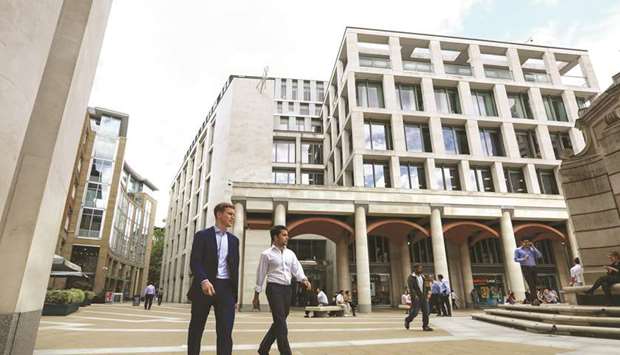The British pound hit a seven-week high against the dollar yesterday on easing fears of a no-deal Brexit. Stock markets meanwhile won support after China said some US agricultural products including pork and soybeans would be exempt from added tariffs, ahead of trade talks between Beijing and Washington scheduled for October.
In London, the FTSE 100 closed up 0.3% to 7,367.46 points; Frankfurt — DAX 30 ended up 0.5% to 12,468.53 points and Paris — CAC 40 closed up 0.2% to 5,655.46 points yesterday.
The announcement was the latest in a series of conciliatory measures between the world’s two biggest economies, who for the past year have been locked in a bitter trade war resulting in tit-for-tat tariffs on hundreds of billions of dollars in bilateral trade.
In foreign exchange, the pound was in focus after the UK currency jumped to its highest level since late July.
The pound “has rallied...as traders are less fearful about the possibility of a no-deal Brexit”, noted David Madden, analyst at CMC Markets UK.
It comes after Britain’s parliamentary speaker warned Prime Minister Boris Johnson not to disobey the law by refusing to ask for a Brexit delay and vowed to thwart any attempt to circumvent legislation.
Parliament passed a law earlier this month aimed at preventing a no-deal Brexit, but Johnson is adamant Britain will still leave the EU on schedule on October 31 with or without a withdrawal agreement.
The speaker of Britain’s House of Commons John Bercow said disobeying the law “would be the most terrible example to set to the rest of society”, according to Britain’s Press Association news agency.
In a speech in London on Thursday, Bercow warned that if the government came close to doing so, parliament “would want to cut off such a possibility and do so forcefully”. In equities markets, all key European indices ended the day higher, while on Wall Street, the DJIA and S&P 500 posted modest gains in the late New York morning, while the Nasdaq was a touch lower.
Earlier, equities had risen in Asia after the ECB on Thursday unveiled a fresh round of economic stimulus and another interest rate cut.
Global markets were buoyed earlier in the week by a growing sense that central banks were set on easing monetary policy to support growth, and the ECB did not disappoint.
It said it would restart its bond-buying quantitative easing programme to boost liquidity, provide support for struggling banks and reduce borrowing costs deeper into negative territory in a bid to kickstart lending.
The announcement, while slightly short of expectations, was broadly cheered by markets, sending equities in Europe and New York higher Thursday.
“In the end, it wasn’t a big bazooka, but ECB President Mario Draghi did his level best trying to convince investors that monetary policy will remain extremely accommodative for some considerable time to come,” said Gavin Friend, a senior market strategist at National Australia Bank.
The news also provided further hope that the Federal Reserve would cut rates at its meeting next week, even though data showed a jump in US inflation last month.

Pedestrians pass the London Stock Exchange Group offices in Paternoster Square. The FTSE 100 closed up 0.3% to 7,367.46 points yesterday.
